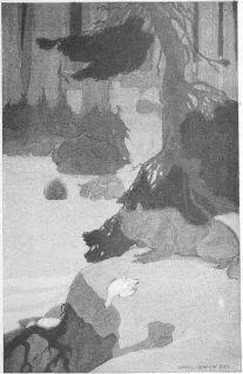Jack London - Love of Life
Здесь есть возможность читать онлайн «Jack London - Love of Life» весь текст электронной книги совершенно бесплатно (целиком полную версию без сокращений). В некоторых случаях можно слушать аудио, скачать через торрент в формате fb2 и присутствует краткое содержание. Жанр: Классическая проза, на английском языке. Описание произведения, (предисловие) а так же отзывы посетителей доступны на портале библиотеки ЛибКат.
- Название:Love of Life
- Автор:
- Жанр:
- Год:неизвестен
- ISBN:нет данных
- Рейтинг книги:4 / 5. Голосов: 1
-
Избранное:Добавить в избранное
- Отзывы:
-
Ваша оценка:
- 80
- 1
- 2
- 3
- 4
- 5
Love of Life: краткое содержание, описание и аннотация
Предлагаем к чтению аннотацию, описание, краткое содержание или предисловие (зависит от того, что написал сам автор книги «Love of Life»). Если вы не нашли необходимую информацию о книге — напишите в комментариях, мы постараемся отыскать её.
Love of Life — читать онлайн бесплатно полную книгу (весь текст) целиком
Ниже представлен текст книги, разбитый по страницам. Система сохранения места последней прочитанной страницы, позволяет с удобством читать онлайн бесплатно книгу «Love of Life», без необходимости каждый раз заново искать на чём Вы остановились. Поставьте закладку, и сможете в любой момент перейти на страницу, на которой закончили чтение.
Интервал:
Закладка:
“To-morrow I will put up head-boards with their names,” Hans said, when the graves were filled in.
Edith was sobbing. A few broken sentences had been all she was capable of in the way of a funeral service, and now her husband was compelled to half-carry her back to the cabin.
Dennin was conscious. He had rolled over and over on the floor in vain efforts to free himself. He watched Hans and Edith with glittering eyes, but made no attempt to speak. Hans still refused to touch the murderer, and sullenly watched Edith drag him across the floor to the men’s bunk-room. But try as she would, she could not lift him from the floor into his bunk.
“Better let me shoot him, and we’ll have no more trouble,” Hans said in final appeal.
Edith shook her head and bent again to her task. To her surprise the body rose easily, and she knew Hans had relented and was helping her. Then came the cleansing of the kitchen. But the floor still shrieked the tragedy, until Hans planed the surface of the stained wood away and with the shavings made a fire in the stove.
The days came and went. There was much of darkness and silence, broken only by the storms and the thunder on the beach of the freezing surf. Hans was obedient to Edith’s slightest order. All his splendid initiative had vanished. She had elected to deal with Dennin in her way, and so he left the whole matter in her hands.
The murderer was a constant menace. At all times there was the chance that he might free himself from his bonds, and they were compelled to guard him day and night. The man or the woman sat always beside him, holding the loaded shot-gun. At first, Edith tried eight-hour watches, but the continuous strain was too great, and afterwards she and Hans relieved each other every four hours. As they had to sleep, and as the watches extended through the night, their whole waking time was expended in guarding Dennin. They had barely time left over for the preparation of meals and the getting of firewood.
Since Negook’s inopportune visit, the Indians had avoided the cabin. Edith sent Hans to their cabins to get them to take Dennin down the coast in a canoe to the nearest white settlement or trading post, but the errand was fruitless. Then Edith went herself and interviewed Negook. He was head man of the little village, keenly aware of his responsibility, and he elucidated his policy thoroughly in few words.
“It is white man’s trouble,” he said, “not Siwash trouble. My people help you, then will it be Siwash trouble too. When white man’s trouble and Siwash trouble come together and make a trouble, it is a great trouble, beyond understanding and without end. Trouble no good. My people do no wrong. What for they help you and have trouble?”
So Edith Nelson went back to the terrible cabin with its endless alternating four-hour watches. Sometimes, when it was her turn and she sat by the prisoner, the loaded shot-gun in her lap, her eyes would close and she would doze. Always she aroused with a start, snatching up the gun and swiftly looking at him. These were distinct nervous shocks, and their effect was not good on her. Such was her fear of the man, that even though she were wide awake, if he moved under the bedclothes she could not repress the start and the quick reach for the gun.
She was preparing herself for a nervous break-down, and she knew it. First came a fluttering of the eyeballs, so that she was compelled to close her eyes for relief. A little later the eyelids were afflicted by a nervous twitching that she could not control. To add to the strain, she could not forget the tragedy. She remained as close to the horror as on the first morning when the unexpected stalked into the cabin and took possession. In her daily ministrations upon the prisoner she was forced to grit her teeth and steel herself, body and spirit.
Hans was affected differently. He became obsessed by the idea that it was his duty to kill Dennin; and whenever he waited upon the bound man or watched by him, Edith was troubled by the fear that Hans would add another red entry to the cabin’s record. Always he cursed Dennin savagely and handled him roughly. Hans tried to conceal his homicidal mania, and he would say to his wife: “By and by you will want me to kill him, and then I will not kill him. It would make me sick.” But more than once, stealing into the room, when it was her watch off, she would catch the two men glaring ferociously at each other, wild animals the pair of them, in Hans’s face the lust to kill, in Dennin’s the fierceness and savagery of the cornered rat. “Hans!” she would cry, “wake up!” and he would come to a recollection of himself, startled and shamefaced and unrepentant.
So Hans became another factor in the problem the unexpected had given Edith Nelson to solve. At first it had been merely a question of right conduct in dealing with Dennin, and right conduct, as she conceived it, lay in keeping him a prisoner until he could be turned over for trial before a proper tribunal. But now entered Hans, and she saw that his sanity and his salvation were involved. Nor was she long in discovering that her own strength and endurance had become part of the problem. She was breaking down under the strain. Her left arm had developed involuntary jerkings and twitchings. She spilled her food from her spoon, and could place no reliance in her afflicted arm. She judged it to be a form of St. Vitus’s dance, and she feared the extent to which its ravages might go. What if she broke down? And the vision she had of the possible future, when the cabin might contain only Dennin and Hans, was an added horror.
After the third day, Dennin had begun to talk. His first question had been, “What are you going to do with me?” And this question he repeated daily and many times a day. And always Edith replied that he would assuredly be dealt with according to law. In turn, she put a daily question to him,-“Why did you do it?” To this he never replied. Also, he received the question with out-bursts of anger, raging and straining at the rawhide that bound him and threatening her with what he would do when he got loose, which he said he was sure to do sooner or later. At such times she cocked both triggers of the gun, prepared to meet him with leaden death if he should burst loose, herself trembling and palpitating and dizzy from the tension and shock.
But in time Dennin grew more tractable. It seemed to her that he was growing weary of his unchanging recumbent position. He began to beg and plead to be released. He made wild promises. He would do them no harm. He would himself go down the coast and give himself up to the officers of the law. He would give them his share of the gold. He would go away into the heart of the wilderness, and never again appear in civilization. He would take his own life if she would only free him. His pleadings usually culminated in involuntary raving, until it seemed to her that he was passing into a fit; but always she shook her head and denied him the freedom for which he worked himself into a passion.
But the weeks went by, and he continued to grow more tractable. And through it all the weariness was asserting itself more and more. “I am so tired, so tired,” he would murmur, rolling his head back and forth on the pillow like a peevish child. At a little later period he began to make impassioned pleas for death, to beg her to kill him, to beg Hans to put him our of his misery so that he might at least rest comfortably.
The situation was fast becoming impossible. Edith’s nervousness was increasing, and she knew her break-down might come any time. She could not even get her proper rest, for she was haunted by the fear that Hans would yield to his mania and kill Dennin while she slept. Though January had already come, months would have to elapse before any trading schooner was even likely to put into the bay. Also, they had not expected to winter in the cabin, and the food was running low; nor could Hans add to the supply by hunting. They were chained to the cabin by the necessity of guarding their prisoner.
Читать дальшеИнтервал:
Закладка:
Похожие книги на «Love of Life»
Представляем Вашему вниманию похожие книги на «Love of Life» списком для выбора. Мы отобрали схожую по названию и смыслу литературу в надежде предоставить читателям больше вариантов отыскать новые, интересные, ещё непрочитанные произведения.
Обсуждение, отзывы о книге «Love of Life» и просто собственные мнения читателей. Оставьте ваши комментарии, напишите, что Вы думаете о произведении, его смысле или главных героях. Укажите что конкретно понравилось, а что нет, и почему Вы так считаете.












